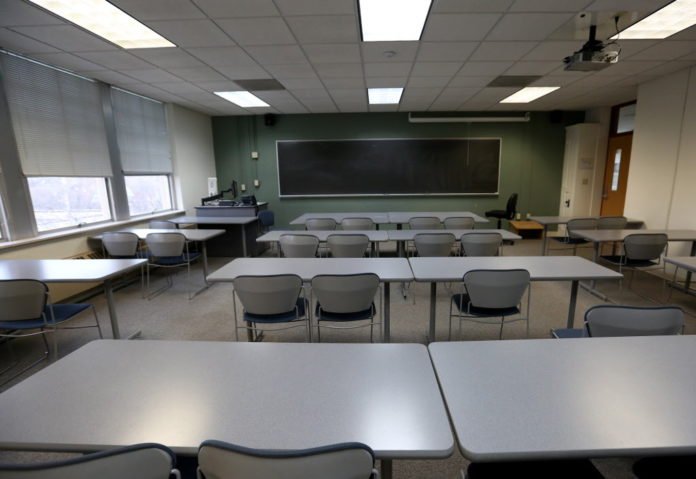Education leaders are developing plans to limit the spread of COVID-19 as public and private K-12 and higher education institutions prepare to return to in-person instruction this fall.
Rolf Wegenke, president of the Wisconsin Association of Independent Colleges and Universities, said in a Wisconsin Manufacturers & Commerce webinar that WAICU members suffered economically from the pandemic. It estimates a cost of $245 million due to refunding room and board, putting curriculum online, taking care of students who could not leave campus and a projected decrease in enrollment for the fall semester.
While private colleges and universities are doing what they can to keep students safe by procuring PPE and COVID-19 tests, Wegenke said the real impact is on the workforce and the economy.
“The short term economic impact is significant. I think long term though… we have to look at what’s going to happen with our economy and with the workforce,” he said, noting a worker shortage in Wisconsin for occupations such as physicians, engineers and teachers.
John Will, president of Wisconsin Indianhead Technical College, said he is also concerned about a workforce shortage.
He noted that during the state’s stay-at-home order, technical colleges supplied the workforce for many of the essential businesses. Indianhead will also be open and offering in-person education come fall semester.
“We plan to keep as many people remote as we can, and that is just to keep human beings off of our campuses to the extent that we can, because that is one of the strategies to minimize the risk of spread,” Will said.
However, Will argued that in-person instruction is ideal as the college expects an up to 5 percent increase in the operating budget to move curriculum online. He also said that technical college students are oftentimes facing financial difficulties making it harder for them to purchase the equipment and internet needed to access online education.
According to Wegenke, WAICU members plan on changing academic calendars on the advice that a recurrence of the virus will happen in the late fall. The academic calendar will start early and end by Thanksgiving. By limiting students on campus after holiday travel, the school hopes to limit the spread of COVID-19.
However, UW System President Ray Cross noted that it’s illegal for UW schools to start classes early.
“We would love to be able to start classes early, but it is against the law in this state, and the Legislature has shown no indication of coming in to help address that, so we don’t have a choice,” Cross said.
But he said that most campuses are trying to find ways to end their classes by Thanksgiving, and then lengthen the winter break to reduce the risk of students going out, getting infected, bringing the virus back and then spreading it.
UW-Madison announced yesterday that it plans to begin fall classes as scheduled on Sept. 2 and offer in-person instruction in many courses until the Thanksgiving recess. After Thanksgiving, UW-Madison will switch to a virtual format for all courses for the final nine days of instruction and exams in order to prevent the spread of COVID-19.
Meanwhile, UW-Milwaukee said it would hold a mix of in-person and virtual classes with similar safety measures put in place. But unlike Madison, it will not return to strictly online education after Thanksgiving.
The UW-System is working to ensure safe face-to-face instruction by enacting social distancing, analyzing every classroom for spacing and encouraging new social norms so that peer pressure will be enough to police best practices.
Cross said that procuring PPE for faculty and staff is a big challenge for UW schools and the UW-System is estimating a minimum of $50 million in additional cost just in PPE.
Several UW campuses are experiencing an increase in enrollment with a few being down, according to Cross. What that looks like in the fall is still unknown, he said.
“This is not a traditional recession, but most of us are pretty positive about what our enrollment is going to look like in the fall,” he said, adding that it’s just as important to the UW-System that K12 is “fully functioning” in the fall as well.
“I share the concern about the K12 system’s ability to operate,” Will said. “We have a lot of older students, our average age at our college is about 27, and many students have families. One of our considerations as we were thinking about how to operate was whether or not childcare would be available for some of our students who have kids and obviously the K12 system plays into that.”
-By Stephanie Hoff
WisBusiness.com






